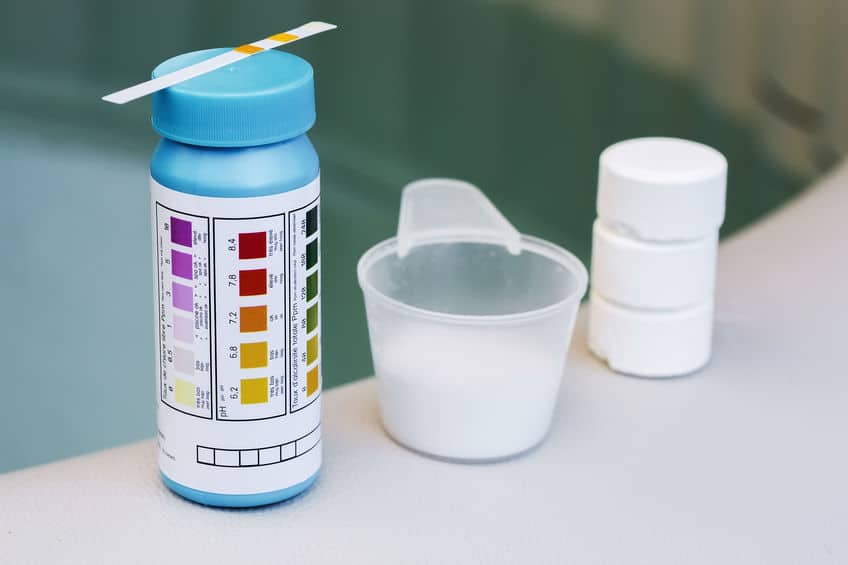If you’re planning on building a pool or are considering switching your current pool from chlorine or bromine to salt water, here are some thoughts as to the pros and cons of each.
We’re basically comparing salt water pools on the one hand versus both chlorine and bromine pools on the other hand since they are both chemical-based pools and are similar to each other.
Here is a comparison of a salt water pool system vs chlorine pool vs bromine pool options.
Salt Water Pools
Pros
- Lower maintenance than chlorine or bromine. Water chemistry is easier to maintain.
- Cheaper per season to maintain. Bags of salt are much cheaper than large amounts of chlorine or bromine.
- Produces softer water which is easier on the skin and eyes.
- No chlorine smell since the chlorinator converts salt (NaCl) to chlorine rather than using the chemical variety.
- Modern salt water systems are set-it-and-forget-it. Set desired chlorine levels, set the pump and heater on a timer. Even when you are away, sanitizing continues automatically with no human interaction.
Cons
- Up front cost is expensive. A modern, decent saltwater pool chlorinator system can run $1200-$2000 to install. You might also need electrical work to hardwire your system and/or provide extra power outlets to handle the chlorinator.
- Along with the chlorinator system, it utilizes a cell which is the device that actually converts the salt to chlorine. It typically lasts 3-5 years and may cost $400 and up.
- A salt water pool still does require some chlorine typically when starting your pool up in the spring and perhaps during the summer if it needs to be shocked.
- Salt water swimming pool systems – while very automatic these days – can still be somewhat complicated to learn.
Chlorine Pools
Pros
- The most common, well-known type of pool system so it’s easy to find help and advice for, as well as chlorine and related materials.
- Easy to operate. Little in the way of technology compared to salt water systems.
- Safer on decks and other materials that are salt-averse and can be damaged by exposure to salt.
- Lower up front costs than saltwater pool systems.
- Chlorine tablets can be put directly into the skimmer to dissolve over time (ie. ease of use) although it may be suggested to put the tab into a sock or other filtering device to slow down the dissolving time.
Cons
- Chlorine can irritate the eyes and makes skin and clothes smell.
- The yearly cost of chlorine is expensive and pool maintenance is time-consuming as chlorine needs to be added regularly to maintain proper chemistry.
- Requires the storage of large amounts of chlorine at home. Care must be taken to store it.
- You need to learn to add chlorine at the right time ie. evenings typically. During hot days, the chlorine can die quickly if added during bright sunny days.
- Improper use of chlorine can stain or bleach pool liners.

Bromine Pools
Pros
- People with sensitive skin may notice better results and less skin irritation with bromine over chlorine. Bromine tends to smell less than chlorine too.
- Tends to be better than chlorine in very hot weather which is why bromine tends to be used in hot tubs and spas which have hot water temperatures.
- In that regard you tend to use less bromine than chlorine which saves money over time.
- Bromine tends to work better in a wider pH range than chlorine which comes in handy when you have more people in your pool.
- Bromine can be regenerated by shocking the pool whereas chlorine dies and needs to be replaced.
Cons
- Bromine tablets are slow releasing which means it can take time to build up or raise bromine levels in a pool.
- Due to its slow-releasing nature, you will probably need to buy a bromine feeder to introduce it to the pool.
- Although it tends to be softer on the skin than chlorine, bromine is still a chemical that can be harsh on skin and eyes and needs to be safely stored.
Conclusion
- Salt water pool systems offer a number of benefits over chlorine and bromine, namely that the water tends to be softer and easier on the eyes.
- Salt water pool systems have a higher up front cost however when you consider the system itself and the chlorinator cell that it uses that needs to be replaced every 3-5 years.
- Chlorine and bromine pools tend to require more maintenance and more testing every few days than salt water pools.
- Salt water pools generally don’t require the storage of as many chemicals since chlorine and bromine by nature are chemicals and need to taken care of accordingly.
- Check out my salt water pool story to see how I first became familiar with them.

